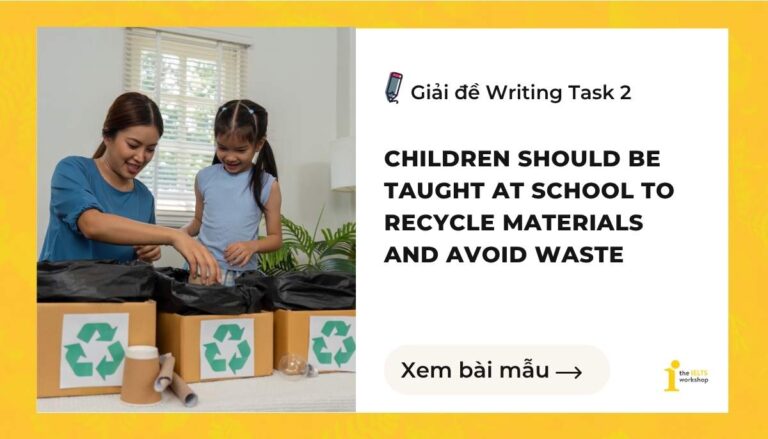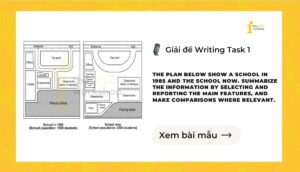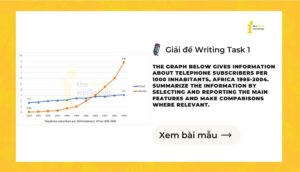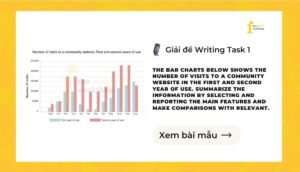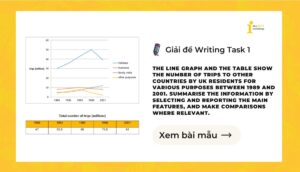Trong chuyên mục Giải đề IELTS Writing Task 2 tuần này, thầy Tuấn Ngọc – giáo viên tại The IELTS Workshop sẽ cùng bạn khám phá chủ đề Children should be taught at school to recycle materials and avoid waste nhé!
1. Phân tích đề bài
1.1. Đề bài
Some people think that children should be taught at school to recycle materials and avoid waste. Other people believe that children should be taught this at home. Discuss both opinions and give your own opinion.
(Một số người cho rằng trẻ em nên được dạy ở trường cách tái chế các vật liệu và tránh lãng phí. Những người khác lại tin rằng trẻ em nên được dạy điều này tại nhà. Hãy thảo luận cả hai quan điểm và đưa ra ý kiến của riêng bạn)
1.2. Phân tích đề bài
Dạng bài: Discuss both views and give opinions
Các từ khóa chính + từ đồng nghĩa để paraphrase:
| Original keyword (from the question) | Paraphrased version(s) used in the essay |
| children | the younger generation / students |
| should be taught | ought to learn / be educated through the official curriculum / schools should be responsible for teaching |
| recycle / recycling | waste recycling / recycling programs / waste-recycling policies |
| materials / waste | waste management / waste-management policies / reduction |
| avoid waste | responsible consumption / sustainable habits / waste reduction |
| taught at school | through the official curriculum / educational institutions / schools should be responsible |
| taught at home | the home is a better environment for fostering daily habits / parents’ involvement is critical / domestic routines |
| learn to recycle and avoid waste | internalize and reinforce environmentally friendly practices / instill environmental awareness |
Xem thêm: Cách làm dạng bài discuss both views trong IELTS Writing task 2
1.3. Dàn bài
| Body 1 – Schools’ Responsibility | – Schools can raise awareness on a large scale. – Teachers have expertise and authority. – Recycling programs and national campaigns can shape students’ environmental attitudes. |
| Body 2 – Parents’ Role | – Habits are built through daily routines at home. – Children imitate parents’ behavior. – Parents as role models reinforce eco-friendly habits. |
2. Bài mẫu
Certain individuals believe that children ought to learn about waste recycling and management through the official curriculum, while others hold the view that the home is a better environment for fostering daily habits. This essay will discuss both viewpoints before presenting my own opinion.
On the one hand, there are several reasons why some people argue that schools should be responsible for teaching recycling and responsible consumption. One major role of educational institutions is to raise awareness on a societal scale. Educators have the authority and expertise to cultivate environmental consciousness among large groups of students. For example, schools can incorporate recycling programs into science or civic education subjects, or implement waste-management policies to help foster environmentally responsible habits. In fact, a nationwide campaign involving thousands of schools could effect a profound change in the younger generation’s attitudes toward environmental issues.
However, others maintain that parents’ involvement is critical in shaping children’s consumption behaviors. A prominent argument is that environmental habits such as recycling or waste management occur more frequently at home rather than in classroom settings. Moreover, home is where values and daily routines are established. Children often absorb positive behaviors through observing their parents; if parents consistently model eco-friendly practices, these habits become deeply ingrained. Therefore, by acting as role models and providing daily supervision, parents can help children successfully internalize and reinforce sustainable habits in their everyday lives.
In conclusion, I contend that environmentally friendly practices such as waste recycling and reduction require the active participation of both schools and families. While educational organizations can help instill environmental awareness and knowledge on a broad scale, parents play an equally vital role by demonstrating and reinforcing sustainable behavior through daily example, ensuring long-term consistency and impact.
Sample by Tuan Ngoc – IELTS Teacher at The IELTS Workshop
3. Vocabulary
| Vocabulary / Phrase | Vietnamese Meaning | Example Sentence |
| official curriculum | chương trình học chính thức | Environmental education should be included in the official curriculum. |
| raise awareness | nâng cao nhận thức | Schools play a vital role in raising awareness about environmental protection. |
| on a societal scale | ở quy mô xã hội | Campaigns on a societal scale can create long-term environmental change. |
| cultivate environmental consciousness | nuôi dưỡng ý thức bảo vệ môi trường | Teachers help cultivate environmental consciousness among students. |
| waste-management policies | chính sách quản lý chất thải | Schools can introduce waste-management policies to reduce plastic waste. |
| effect a profound change | tạo ra sự thay đổi sâu sắc | Educational reforms can effect a profound change in students’ thinking. |
| parents’ involvement | sự tham gia của cha mẹ | Parents’ involvement is crucial in shaping children’s behavior. |
| eco-friendly practices | thói quen thân thiện với môi trường | Children should be encouraged to adopt eco-friendly practices at home. |
| deeply ingrained | ăn sâu, khó thay đổi | Recycling can become a deeply ingrained habit through daily repetition. |
| internalize | thấm nhuần, biến thành thói quen | Children internalize sustainable habits through observation and practice. |
| reinforce | củng cố | Parents can reinforce positive environmental behavior through example. |
| instill awareness | truyền đạt nhận thức | Schools can instill awareness of environmental issues in young learners. |
| sustainable behavior | hành vi bền vững | Promoting sustainable behavior is key to protecting the planet. |
| long-term consistency | sự duy trì ổn định lâu dài | Parental guidance ensures long-term consistency in children’s habits. |
Xem thêm: Cách học từ vựng IELTS hiệu quả từ thầy Đặng Trần Tùng 9.0
Tạm kết
Mong rằng bài viết mẫu trên đã mang đến cho bạn một góc nhìn toàn diện và cách triển khai mạch lạc cho dạng bài Discuss both views and give opinion trong IELTS Writing Task 2 với chủ đề recycle materials and avoid waste
Đừng quên theo dõi chuyên mục [Cập nhật liên tục] Tổng hợp đề thi IELTS Writing 2025 kèm bài mẫu và Bài mẫu Writing Task 2 để củng cố thêm kiến thức và kỹ năng xử lý dạng bài này
Đăng ký ngay HỌC IELTS MIỄN PHÍ tại Website của The IELTS Workshop để luyện tập cùng các giáo viên giàu kinh nghiệm và nhận được hướng dẫn cụ thể hơn nhé!


